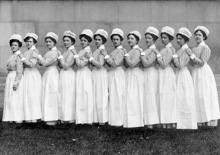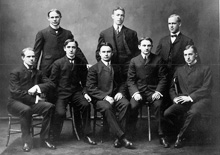Bellevue Hospital Celebrates 275th Anniversary
Dec 15, 2011

Bellevue nurses.
Bellevue house staff 1903.
Bellevue Hospital Center, a member of the New York City Health and Hospitals Corporation (HHC), today hosted a reception in honor of its 275th Anniversary. The oldest continuously operating hospital in America, Bellevue traces its roots back to 1736, when a six-bed infirmary opened on the second floor of an almshouse located on the present day site of City Hall. Throughout its history Bellevue has been a center for medical and mental health innovations, and today it is a widely-recognized institution that provides comprehensive patient care to hundreds of thousands of New Yorkers every year.
“Over the past 275 years, Bellevue has grown from a six-bed infirmary to an internationally renowned 828-bed academic medical center,” said Lynda D. Curtis, Bellevue’s Executive Director/Senior Vice President. “The size, scope, and depth of our services have changed, but we continue to define a remarkable tradition of providing the best care to all regardless of their ability to pay. Bellevue’s enduring values of inclusiveness, continuity, responsiveness and visibility are fundamental to a civil and humane society.”
“The storied history of Bellevue is replete with the profound innovations and historic milestones borne of a deep dedication to the science and the humanity of medicine,” said HHC President Alan D. Aviles. “Today, Bellevue and its dedicated staff continue to remind us that we don’t have to choose between equity and excellence in our healthcare system. We can – and at Bellevue, we do – provide the very best of care and turn no one away.”
Some of Bellevue’s key ‘firsts’ include:
Medicine
- The first maternity ward (1799) and first cesarean section (1867).
- The first Emergency Pavilion (1876) and first ambulance service in the U.S. (1869).
- The first teaching hospital associated with a medical school (1861) and first nursing school (1873).
- The first cardiopulmonary lab (1940) and cardiac clinic for working adults (1911).
Psychiatry:
- The first pavilion for the insane within hospital grounds, considered revolutionary when it was erected in 1879.
- The first I.Q. tests developed by Bellevue psychiatrist Dr. David Wechsler, who joined the Department of Psychiatry in 1932 and served as chief psychologist for 25 years.
- The first children’s psychiatric inpatient service in a general hospital (1920), the world’s first adolescent inpatient psychiatric unit (1937), and the only Children’s and Adolescents’ Comprehensive Psychiatric Emergency Program (CPEP) in New York State (2010).
Present day innovations:
- A Bellevue physician developed the first active immunization for Hepatitis B in 1971.
- One of the first three cases of an illness later determined to be AIDS was reported at Bellevue in 1981.
- The first Child Protection and Development Center in the U.S. (for abused or neglected children) opened in 2000.
Bellevue doctors who treated famous patients:
- Dr. David Hosack treated Alexander Hamilton after the Burr-Hamilton duel in 1804.
- Dr. Charles Augustus Leale, two months after graduating from Bellevue Medical College, treated President Lincoln after he was shot by John Wilkes Booth in 1885.
- Bellevue physician Joseph D. Bryant was the lead surgeon in a secret operation on Pres. Grover Cleveland for jaw cancer aboard a yacht on the East River in 1893.
Famous people who died at Bellevue:
- Stephen Foster, the father of American music, composer of songs including “Oh! Susana,” “Camptown Racers,” and “Old Folks at Home,” in 1864.
- William Sydney Porter, who wrote under the pseudonym O. Henry, author of the Christmas favorite, “The Gift of the Magi,” in 1910.
- Folk and blues singer Huddie William Ledbetter, better known as Lead Belly, in 1949.
Did you know:
- Bellevue has been a leader in battling epidemics including opening the Bellevue Chest Service to combat tuberculosis in 1903 and a day camp for patients with TB started by the Bellevue auxiliary in 1908 on an old ferryboat anchored in the East River.
- In 1918, an African American physician, Dr. Ubert Conrad Vincent, broke down racial barriers and developed a widely used procedure for relief of varicocele known as the Vincent Operation.
- The Ringling Brothers and Barnum & Bailey Circus performed annually in the Bellevue courtyard to entertain patients from 1908 to 1967.
- Bellevue is the designated hospital for the President when he’s in town, dignitaries, U.N. diplomats and injured members of the city’s uniformed forces.
“Bellevue’s history mirrors the growth of New York City and the development of medical science, showing the vital relationship between public health and the health of the city,” said Bellevue Medical Director Dr. Eric Manheimer. “Over the centuries, Bellevue has served as a major incubator for innovations in public health, medical science, and medical education.”
At the event in the expansive Bellevue atrium, hospital officials announced publication of a 24-page booklet entitled, A Bellevue Timeline: Celebrating 275 Years of Caring for New York, and unveiled a 13-panel banner display highlighting influential physicians and key historical events from each of the eleven quarter centuries of Bellevue’s history.
As part of the recognition events surrounding the 275th anniversary, Bellevue has been recording oral histories in conjunction with StoryCorps, an independent nonprofit organization that records, shares and preserves stories of American life. The interviews conducted at Bellevue will be archived at the American Folklife Center of the Library of Congress and selections will be played at listening stations at Bellevue beginning next year. Selections will also play on the Bellevue/HHC website, as well as the StoryCorps website.
Bellevue is also raising funds for the establishment of a Museum on the Bellevue campus to showcase the narrative of the hospital’s history and display photos and original objects from the Bellevue archive.
Last year, Bellevue Hospital Center provided over a half million clinic visits; 126,000 Emergency room visits; close to 10,000 ambulatory surgeries; and 31,000 inpatient discharges. Almost 30% of clinic visits and 38% of emergency room visits were to uninsured individuals, including the newly unemployed, the undocumented and new immigrants. When Bellevue began serving New Yorkers, it had just two employees — a visiting doctor and a visiting surgeon. Today, Bellevue is a major economic force in the community, employing over 4,700 full time employees and an additional 395 clinical affiliates from the NYU School of Medicine.
About Bellevue
Bellevue is a member of the New York City Health and Hospitals Corporation (HHC) and is America’s oldest continuously operating hospital, established in 1736. Affiliated with the NYU School of Medicine, Bellevue is a major referral center for highly complex cases. Clinical centers of excellence include: Emergency Medicine and Trauma Care; Cardiovascular Services; Designated Regional Perinatal Center and Neonatal Intensive Care Unit (ICU); Comprehensive Children’s Psychiatric Emergency Program; and Cancer Services.
About HHC
The New York City Health and Hospitals Corporation (HHC) is a $6.7 billion integrated healthcare delivery system with its own 420,000 member health plan, MetroPlusHealth, and is the largest municipal healthcare organization in the country. HHC serves 1.4 million New Yorkers every year and more than 475,000 are uninsured. HHC provides medical, mental health and substance abuse services through its 11 acute care hospitals, five skilled nursing facilities, six large diagnostic and treatment centers and more than 70 community based clinics. HHC Health and Home Care also provides in-home services for New Yorkers. HHC was the 2008 recipient of the National Quality Forum and The Joint Commission’s John M. Eisenberg Award for Innovation in Patient Safety and Quality. For more information, visit www.nychhc.org/hhc or find us on facebook.com/NYCHealthSystem or twitter.com/NYCHealthSystem.
